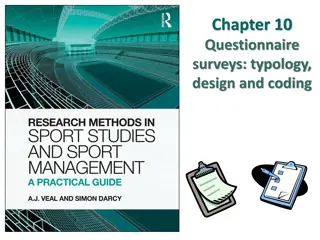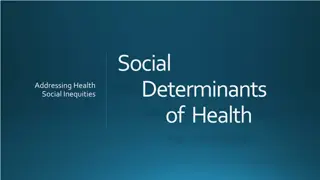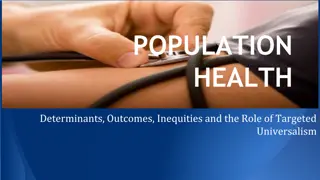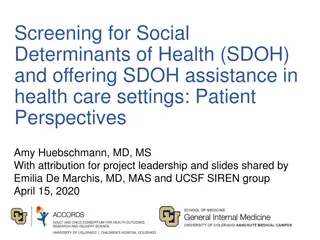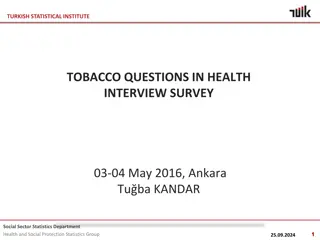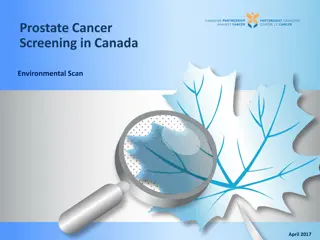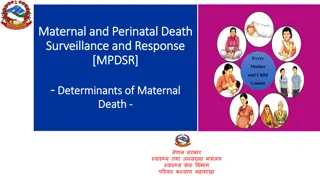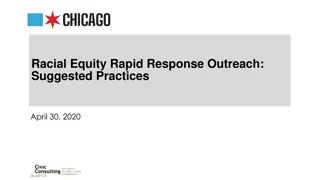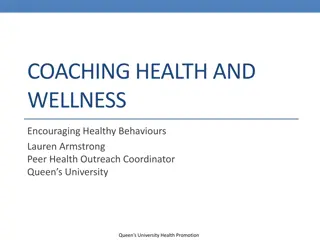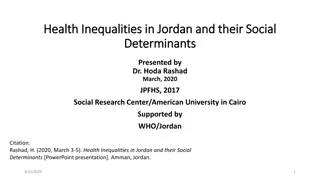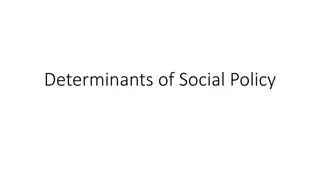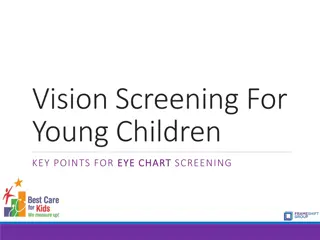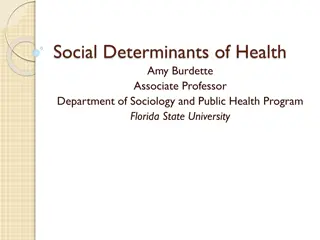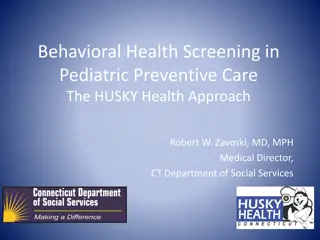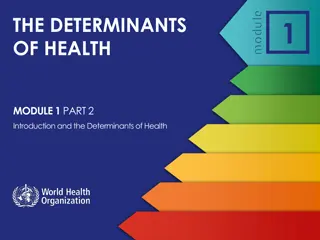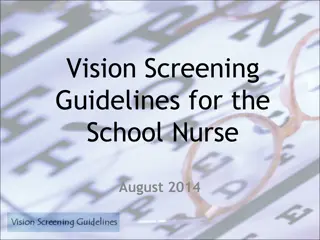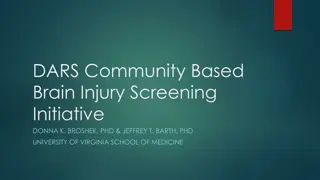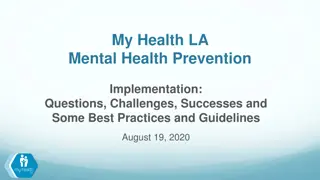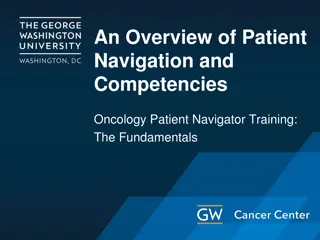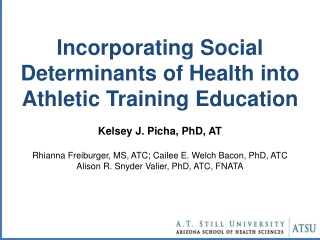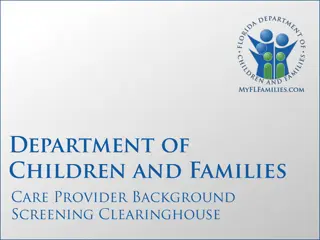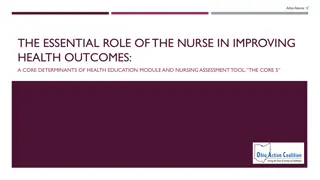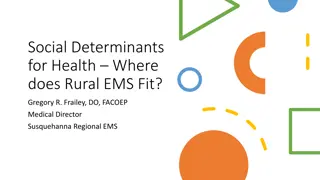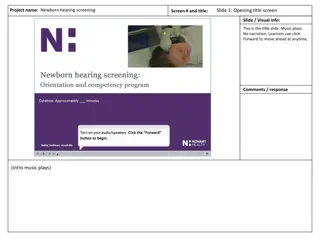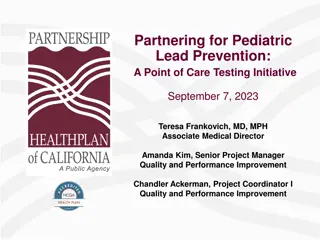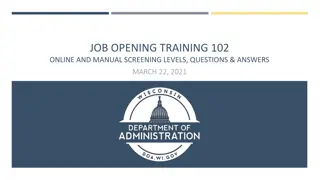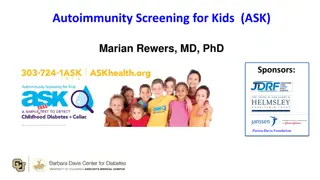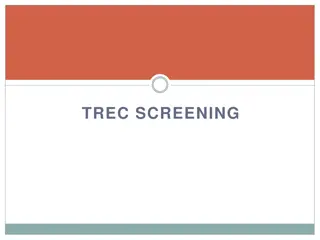Social Determinants of Health Screening Questionnaire Follow-up
The content outlines a screening questionnaire for Social Determinants of Health (SDOH) with follow-up questions based on positive screening results. It covers areas such as primary care provider, employment status, education level, health literacy, substance use, housing stability, food insecurity, and experiences of abuse. Referral information is also provided for further assistance based on responses.
Download Presentation

Please find below an Image/Link to download the presentation.
The content on the website is provided AS IS for your information and personal use only. It may not be sold, licensed, or shared on other websites without obtaining consent from the author. Download presentation by click this link. If you encounter any issues during the download, it is possible that the publisher has removed the file from their server.
E N D
Presentation Transcript
1 SDOH Short Form Scorer Positive screens are indicated in red. If a patient screens positive, follow-up with the additional screening questions and/or referrals outlined in the red boxes on pages 3-5. 1. Do you have a primary care provider? If yes, who? No Yes 2. Are you employed? (check all that apply) Yes, full-time No because of a disability or illness Yes, part-time No because of child or elder care Yes, contract No because of transportation challenges I m a student No, other reason Yes, seasonal No because of difficulty finding a job If employed, at work are you exposed to any chemicals, materials, or conditions that you worry may not be safe for your health (whether you are pregnant or not)? Yes No 3. What is your highest level of education? Less than high school Some high school High school diploma/GED Some college Associates degree Bachelors degree Masters degree Doctoral degree 4. How comfortable are you understanding written health information? Not at all A little bit Somewhat Quite a bit Extremely 5. How comfortable are you understanding what you are told about your health? Not at all A little bit Somewhat Quite a bit Extremely 6. How comfortable are you completing medical forms on your own? Not at all A little bit Somewhat Quite a bit Extremely 7. Do you use any of these products? (check all that apply) Cigarettes Electronic cigarettes Smokeless Tobacco Hookah Cigar s No, none of these products If yes: How old were you when you first started using this/these product(s)? Cigars/ Cigarettes How much do you use each day? Packs Pods Other: Have you ever tried to quit? Yes No Are you interested in attempting to quit? Yes No Continue
2 8. How often do you drink alcohol? Never Less than monthly Monthly Weekly Daily 9. How often do you have four or more alcoholic drinks on one occasion? Never Less than monthly Monthly Weekly Daily 10. How many alcoholic drinks do you have on a typical day when you are drinking? 0-2 3-4 5-6 7-9 10+ Yes, now Yes, in the past 11. Have you ever been in treatment for an alcohol problem? No, never 12. Are you currently in recovery for alcohol or substance use? Yes No 13. In the past year, have you used a recreational drug or used a prescription medication for non-medical reasons (including marijuana)? No Yes In the past two weeks, how often have you felt the following ways? 14. Little interest or pleasure in doing things Not at all Several days More than half the days Nearly every day 15. Feeling down, depressed, or hopeless Not at all Several days More than half the days Nearly every day 16. In the next two months, are you worried that you may not have stable housing? Yes No 17. Think about the place you live. Do you have any problems with the following? (check all that apply) Bug infestation Inadequate heat Lead paint or pipes Mold Oven or stove not working No or not working smoke detectors None of the above Water leaks 18. In the past year, did you worry that your food would run out before you got money to buy more? Yes No In the past year, has someone: 19. Humiliated or emotionally abused you Yes No 20. Made you afraid of them Yes No 21. Kicked, hit, slapped, or otherwise physically hurt you Yes No 22. Raped or forced you to have any kind of sexual activity you did not want to Yes No 23. Told you not to use birth control (like the pill, shot, ring, etc.), taken away your birth control, or kept you from going to the clinic to get birth control 24. Made you have sex without a condom when you wanted to use one, including taking off the condom during sex or damaging the condom on purpose Yes No Yes No 25. Made or forced you to use birth control when you did not want to at all or did not want to use that specific method Yes No
3 Follow-up and referral information 1. Do you have a primary care provider? Staff response: Ask Would you like a referral to a PCP? If they answer yes, refer to PCP resources. Referral: Refer patients to _________________________________ [PCP referral]. 2. Are you employed? (check all that apply) Staff response to being unemployed: - Ask Have you applied for unemployment benefits? If they answer no, refer to unemployment benefits. - Ask Are you interested in job training programs? If they answer yes, refer to job training programs. - If they checked No because of transportation challenges, ask What transportation challenges do you have? Referrals for unemployment: - Refer to The Massachusetts Department of Unemployment Assistance. - Refer to __________________________________ [jobs trainings programs referral]. - Refer to __________________________________ [transportation resources]. Staff response to workplace exposures: Ask What are you exposed to at work that you are concerned about? Flag answer for clinician to discuss during visit. Referrals for workplace exposures: N/A 3. What is your highest level of education? Staff response: Pay attention to patient age. If a patient is less than 18 years old, they may not need referrals. Ask Are you interested in learning about opportunities to earn a GED or complete your education? If they say yes, refer to GED/education resources. Referral: Refer to __________________________________ [GED/education resources]. 4. How comfortable are you understanding written health information? 5. How comfortable are you understanding what you are told about your health? 6. How comfortable are you completing medical forms on your own? Staff response: Keep the patient s literacy level in mind during the visit. They may require assistance reading and/or understanding written materials, understanding verbal instructions or information, or completing medical forms you give them. Flag for clinician to keep in mind during visit. Referral: N/A 7. Do you use any of these products? Staff response: Clarify which tobacco products the patient uses for the medical record. Flag answer for clinician to discuss during visit. Referral: N/A Are you interested in attempting to quit? Staff response: Ask Would you like a referral to a program to help you stop smoking? If they answer yes, refer to smoking cessation program. Referral: Refer patients to _________________________________ [smoking cessation referral].
4 8. How often do you drink alcohol? 9. How often do you have four or more alcoholic drinks on one occasion? 10. How many alcoholic drinks do you have on a typical day when you are drinking? Staff response: Flag the positive screen (red answers to any and/or all of questions 8, 9, and 10) for clinician to discuss during visit. Clinician response: Ask How do you feel about your alcohol consumption? Would you like any help to reduce your alcohol use? If they answer yes, refer to alcohol treatment/recovery resources. If you engage a patient in a discussion about their alcohol consumption, you may choose to use these questions as a guide: - How often during the last year have you found that you were not able to stop drinking once you had started? - How often during the last year have you not been able to do what was normally expected of you because of drinking? - How often during the last year have you been unable to remember what happened the night before because of your drinking? - Has your drinking negatively impacted your relationships with the people close to you? Referral: Refer patients to _________________________________ [alcohol treatment/recovery resources]. 11. Have you ever been in treatment for an alcohol problem? 12. Are you currently in recovery for alcohol or substance use? Staff response: Flag answers for clinician to discuss during visit. Referral: N/A 13. In the past year, have you used a recreational drug or used a prescription medication for non-medical reasons (including marijuana)? Staff response: Flag the positive screen for the clinician to discuss during visit. Clinician response: Ask How do you feel about your substance use? Would you like any help to reduce your substance use? If they answer yes, refer to substance use treatment/recovery resources. If you engage a patient in a discussion about their substance use, you may choose to use these questions as a guide: - Have you used substances other than those required for medical reasons? - Do you use more than one substance at a time? - Are you unable to stop using substances when you want to? - Have you ever had blackouts or flashbacks as a result of substance use? - Has your substance use negatively impacted your relationships with the people close to you? - Have you ever experienced withdrawal symptoms (felt sick) when you stopped taking substances? - Have you ever had medical problems due to your substance use (e.g., memory loss, hepatitis, convulsions)? Referral: Refer patients to _________________________________ [substance use treatment/recovery resources]. 14. Little interest or pleasure in doing things 15. Feeling down, depressed, or hopeless Staff response: Flag the positive screen (red answers to 14 and/or 15) for the clinician to discuss during visit. Clinician response: Ask the patient about their mental health. Focus on asking about immediate safety (i.e. do they have any thoughts of harming themselves or others). Ask Are you currently seeing a therapist/getting help from someone? Would you like a referral to a therapist? If they answer yes, refer to mental health services. If you engage a patient in a discussion about their mental health, you may choose to use these questions as a guide: - Over the last 2 weeks, how often have you: - Had trouble falling asleep, staying asleep, or sleeping too much - Felt tired or had little energy - Had poor appetite or overate - Felt bad about yourself or that you have let yourself or your family down - Had trouble concentrating on things, such as reading the newspaper or watching television - Moved or spoke so slowly that other people could have noticed. Or, the opposite - were so fidgety or restless that you moved around a lot more than usual - Had thoughts that you would be better dead or of hurting yourself in some way Referral: Refer patients to _________________________________ [mental health services]. For emergent safety concerns: _________________________________ [emergency mental health resources].
5 16. In the next two months, are you worried that you may not have stable housing? 17. Think about the place you live. Do you have any problems with the following? (check all that apply) Staff response: Ask Tell me more about your housing situation to learn more information. Flag answers for clinician to discuss during visit. Ask Would you like a referral to housing resources? If they answer yes, refer to housing resources and/or tenants rights organizations based on need. Referral: Refer patients to _________________________________ [housing/tenants rights resources]. 18. In the past year, did you worry that your food would run out before you got money to buy more? Staff response: Ask Would you like help accessing free food? If they answer yes, refer to food insecurity resources. Referral: Refer patients to _________________________________ [food insecurity resources]. 19. Humiliated or emotionally abused you 20. Made you afraid of them 21. Kicked, hit, slapped, or otherwise physically hurt you 22. Raped or forced you to have any kind of sexual activity you did not want to 23. Told you not to use birth control (like the pill, shot, ring, etc.), taken away your birth control, or kept you from going to the clinic to get birth control 24. Made you have sex without a condom when you wanted to use one, including taking off the condom during sex or damaging the condom on purpose 25. Made or forced you to use birth control when you did not want to at all or did not want to use that specific method Staff response: Flag positive screen (red answers to any and/or all of questions 19-25) for clinician to discuss during visit. If form was administered verbally, respond with Thank you for telling me that. Keeping you safe is part of keeping you healthy. I will let the clinician know. Clinician response: Discuss IPV with the patient to learn more about the situation. Verbally respond with Thank you for telling me that. May I ask a colleague to come talk to you and offer some information you may find useful? If they answer yes, page/summon clinical or case management champion with training in safety planning and knowledge of local resources. Allow adequate time for a colleague to prepare custom referrals. If they answer no, accept that the patient declines assistance. Let them know that this clinic is always a safe space to seek help. Note: If a patient screens positive and is under 18 years old, this may be a moment of mandatory reporting. Consult with a colleague to determine appropriate next steps. Referral: Refer patients to _________________________________ [clinical/case management champion/IPV resources]. Once finished, remember to thank the patient for taking the time to complete the form and for providing this information. Remind them that, like the rest of their visit, this information will be kept in strict confidence and will be used to inform better care or referrals.


